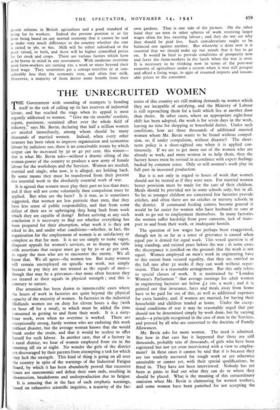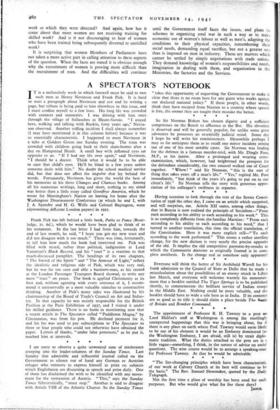THE UNRECRUITED WOMEN T HE Government with sounding of trumpets is
bending itself to the task of calling up its last reserves of industrial labour, and has reached the stage when its appeal is most urgently addressed to women. " Give me six months' resolute, urgent, persistent, ,sustained effort over the whole field of industry," says Mr. Bevin, declaring that half a million women are needed immediately, among whom should be many thousands of married women. Indeed, when every other measure has been taken to improve organisation and economise labour by judicious use, there is no conceivable means by which- output can be increased by 3o or 40 per cent. this winter— that is what Mr. Bevin asks—without a drastic sifting of the woman-power of the country to produce a new army of female labour for the workshops and the Services. Women are needed, married and single, who now, it is alleged, are holding back. By some means they must be 'transferred from their present less essential work to the absolutely essential work of war.
It is agreed that women must play their part no less than men; and if they will not come voluntarily then compulsion must be applied. But what are the facts? Is it true, as is sometimes suggested, that women are less patriotic than men, that they have less sense of public responsibility, and that from some defect of their sex or upbringing they hang back from work which they are capable of doing? Before arriving at any such conclusion it is necessary to find out whether everything has been prepared for their absorption, what work it is they are asked to do, and under what conditions—whether, in fact, the organisation for the employment of women is as satisfactory or complete as that for men. It is no use simply to make vague, eloquent appeals for women's services, or to thump the table with assertions that output must go up by 3o or 4o per cent. to equip the men who are to encounter the enemy. We all know that. We all agree—the women too. But many women still remain unemployed on specific war work, not simply because in pay they are not treated as the equals of men— though that may be a grievance—but more often because they are treated as their equals in physical strength ; and this is contrary to nature.
Our attention has been draivn to innumerable cases where the hours of work in factories are quite beyond the physical capacity of the majority of women. In factories in the industrial Midlands women are on duty for eleven hours a day (with an hour off for a meal), to which must be added the time consumed in getting to and from their work. It is a sixty- hour week, 'even when no overtime is worked. There are exceptionally strong, hardy women who are enduring this work without disaster, but the average woman knows that she would break under the strain, and that it would be useless to offer herself for such labour. In another case, that of a factory in a rural district, we hear of women employed from six in the morning till six at night. No wonder the girls of the district are discouraged by their parents from attempting a task for which they lack the strength. This kind of thing is going on all over the country in spite of the warnings of the Industrial Fatigue Board, by which it has -been abundantly proved that excessive hours are uneconomic and defeat their own ends, resulting in absenteeism, breakdowns and underproduction due to fatigue.
It is amazing that in the face of such emphatic warnings, based on exhaustive scientific inquiries, a majority of the fac- tories of this country are still making demands on women which they are incapable of satisfying, and the Ministry of Labour is still reproaching them for a fault which lies at another door than theirs. In other cases, where an appropriate eight-hour shift has been adopted, the work is for seven days in the week, leaving no time for shopping or household duties. Under such conditions, how are those thousands of additional married women whom Mr. Bevin wants to be found without compul- sion, or, if under compulsion, without disaster? The short- term policy is a short-sighted one when it is applied con- tinuously. If we are to get more out of the women who are already at work, and more women in to help them, then the factory hours must be revised in accordance with expert findings backed by common sense. Only so will women's work play its full part in increased production.
But it is not only in regard to hours of work that women should not be treated as if they were men. For married women better provision must be made for the care of their children. Meals should be provided not in some schools only, but in all. So far as younger children are concerned few factories provide crèches, and often there are no creches or nursery schools in the district. If communal feeding centres become general it would be far easier for women who have husbands or sons at work to go out to employment themselves. In many factories the women suffer hardship from poor canteens, lack of trans- port to and from their work, or inadequate hostels.
The question of low wages has perhaps been exaggerated, though not in so far as a sense of grievance is caused when equal pay is denied for equal work. This vexed question is of long standing, and existed years before the war ; in some cases the discrepancy is justified on the grounds that the work is not equal. Women employed on men's work in engineering have to this extent been secured equality, that they are entitled to the full rate after 32 weeks if they can work without super- vision. That is a reasonable arrangement. But this only refers to special classes of work. It is maintained by " London Women's Parliament " that average earnings for adult women in engineering factories are below £2 los. a week ; and it is pointed out that insurance, fares and meals away from home have to be paid for out of this, as well as additional expenses for extra laundry, and, if women are married, for having their households and children tended at home. Under the excep- tional conditions of war it may be reasonably urged that pay should not be determined simply by work done, but by varying needs—a principle recognised in the case of men in the Services, and pressed by all who are converted to the doctrine of Family Allowances.
Mr. Bevin asks for more women. The need is admitted. But how in that case has it happened that there are still thousands, probably tens of thousands, of girls who have been registered but not yet even interviewed with a view to employ- ment? In these cases it cannot be said that it is because they are too tenderly nurtured for rough work or are otherwise unsuitable or cannot yet, with their special qualifications, be fitted in. They have not been interviewed. Nobody has yet been at pains to find out what they can do or where they should be placed. What is the meaning of this extraordinary omission when Mr. Bevin is clamouring for women workers, and some women have been punished for not accepting the work to which they were directed? And again, how has it come about that more women are not receiving training for skilled work? And is it not discouraging to hear of women who have been trained being subsequently diverted to unskilled work?
It is surprising that women Members of Parliament have not taken a more active part in calling attention to these aspects of the question. When the facts are stated it is obvious enough why the recruitment of women is proving more difficult than the recruitment of men. And the difficulties will continue until the Government itself faces the issues, and plans its schemes in organising total war in such a way as to make economic use of women's labour as well as men's, adapting the conditions to their physical capacities, remembering their social needs, demanding equal sacrifice, but not a greater ont than is imposed on men in industry. These are matters which cannot be settled by simple negotiations with trade unions. They demand knowledge of women's responsibilities and needs, imagination in dealing with them, and organisation in the Ministries, the factories and the Services.























 Previous page
Previous page